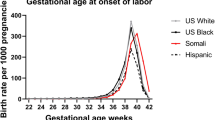Abstract
Objective Despite heterogeneity among Pacific Islanders, most studies aggregate them regardless of origin. Thus, limited information is available about perinatal outcomes among various subgroups of Pacific Islanders in the United States, including immigrants from the Republic of the Marshall Islands. We sought to evaluate perinatal outcomes among Marshallese women. Methods We conducted a cross-sectional study of women with at least one singleton live birth between 1997 and 2013 in two Arkansas counties using birth certificate data from the Arkansas Department of Health. Unadjusted and adjusted prevalence ratios (PR) and 95% confidence intervals (CI) were calculated from modified Poisson regression models. Results Of the 91,662 singleton births in both counties during the study period, 2488 were to Marshallese women. In adjusted analyses, Marshallese women had higher prevalence of “other medical risk factors” (PR = 1.47; 95% CI 1.30, 1.65) than NH White women. Marshallese women had higher rates of precipitous labor and fetal distress during labor compared to NH White women (PR = 2.65; 95% CI 2.22, 3.17 and 1.89; 95% CI 1.62, 2.21, respectively). Marshallese were also more likely to have tocolysis (PR = 1.43; 95% CI 1.16, 1.76), forceps (PR = 1.68; 95% CI 1.16, 2.43) or vacuum (PR = 1.89; 95% CI 1.60, 2.22) used in delivery and cesarean section (PR = 1.13; 95% CI 1.01, 1.27). Marshallese infants had higher rates of anemia (PR = 3.10; 95% CI 2.01, 4.77), birth injury (PR = 2.13; 95% CI 1.50, 3.03), assisted ventilation < 30 min (PR = 2.11; 95% CI 1.64, 2.71), preterm birth (PR = 1.67; 95% CI 1.50, 1.83), and small-for-gestational age (PR = 1.25; 95% CI 1.12, 1.39) than NH White infants. Conclusions Marshallese women and infants had higher rates of adverse perinatal outcomes compared to their NH White counterparts. Additional studies are needed to determine if perinatal outcomes among the Marshallese differed from other Pacific Islander subgroups.
Similar content being viewed by others
References
Alexander, G. R., Tompkins, M. E., Allen, M. C., & Hulsey, T. C. (1999). Trends and racial differences in birth weight and related survival. Maternal and Child Health Journal, 3(2), 71–79.
Ayers, B. L., Purvis, R. S., Bing, W. I., Rubon-Chutaro, J., Hawley, N. L., Delafield, R., … McElfish, P. A. (2018). Structural and Socio-cultural barriers to prenatal care in a US Marshallese community. Maternal and Child Health Journal. https://doi.org/10.1007/s10995-018-2490-5.
Central Intelligence Agency. World Factbook:Marshall Islands. (2014). Retrieved December 12, 2017 from https://www.cia.gov/library/publications/the-world-factbook/geos/rm.html.
Chang, A. L., Hurwitz, E., Miyamura, J., Kaneshiro, B., & Sentell, T. (2015). Maternal risk factors and perinatal outcomes among Pacific Islander groups in Hawaii: A retrospective cohort study using statewide hospital data. BMC Pregnancy and Childbirth, 15, 239. https://doi.org/10.1186/s12884-015-0671-4.
Hixson, L., Hepler, B. B., & Kim, M. O. (2012). The Native Hawaiian and Other Pacific Islander Population: 2010. Report Number C2010BR-12. 2010 Census Briefs https://www.census.gov/library/publications/2012/dec/c2010br-12.html.
McElfish, P. A., Hallgren, E., & Yamada, S. (2015). Effect of US health policies on health care access for Marshallese migrants. American Journal of Public Health, 105(4), 637–643. https://doi.org/10.2105/ajph.2014.302452.
Park, C. B., Braun, K. L., Horiuchi, B. Y., Tottori, C., & Onaka, A. T. (2009). Longevity disparities in multiethnic Hawaii: An analysis of 2000 life tables. Public Health Reports, 124(4), 579–584.
Rao, A. K., Daniels, K., El-Sayed, Y. Y., Moshesh, M. K., & Caughey, A. B. (2006). Perinatal outcomes among Asian American and Pacific Islander women. American Journal of Obstetrics and Gynecology, 195(3), 834–838. https://doi.org/10.1016/j.ajog.2006.06.079.
Ro, M. J., & Yee, A. K. (2010). Out of the shadows: Asian Americans, Native Hawaiians, and Pacific Islanders. American Journal of Public Health, 100(5), 776–778. https://doi.org/10.2105/AJPH.2010.192229.
Roehr, B. (2010). Asians and Pacific islanders in US need greater prominence in research. BMJ, 340. https://doi.org/10.1136/bmj.c2495.
Schempf, A. H., Mendola, P., Hamilton, B. E., Hayes, D. K., & Makuc, D. M. (2010). Perinatal outcomes for Asian, Native Hawaiian, and other Pacific Islander mothers of single and multiple race/ethnicity: California and Hawaii, 2003–2005. American Journal of Public Health, 100(5), 877–887. https://doi.org/10.2105/AJPH.2009.177345.
Srinivasan, S., & Guillermo, T. (2000). Toward improved health: Disaggregating Asian American and Native Hawaiian/Pacific Islander data. American Journal of Public Health, 90(11), 1731–1734.
The American Community—Pacific Islanders: 2004. (2007). Washington, DC. Retrieved December 12, 2017 from http://www.census.gov/prod/2007pubs/acs-06.pdf.
Todd, W. A., & Peabody, J. W. (2004). Maternal predictors of infant health outcomes among Hawaiians. Hawaii Medical Journal, 63(2), 40–44.
Tsitas, M., Schmid, B. C., Oehler, M. K., & Tempfer, C. B. (2015). Macrosomic and low birth weight neonates in Pacific Islanders from Samoa: A cas–-control study. Archives of Gynecology and Obstetrics, 292(6), 1261–1266. https://doi.org/10.1007/s00404-015-3773-3.
Wong, L. F., Caughey, A. B., Nakagawa, S., Kaimal, A. J., Tran, S. H., & Cheng, Y. W. (2008). Perinatal outcomes among different Asian-American subgroups. American Journal of Obstetrics and Gynecology, 199(4), 382.e381–386. https://doi.org/10.1016/j.ajog.2008.06.073.
Working Group of the Applied Research Center, N. C. O. A. P. A. (2013). Best practices: Researching Asian Americans, Native Hawaiians and Pacific Islanders.
Yamada, S. (2004). Cancer, reproductive abnormalities, and diabetes in Micronesia: The effect of nuclear testing. Pacific Health Dialog, 11(2), 216–221.
Acknowledgements
The authors would like to thank Robin Richardson and Lindsey Overman for assisting with the preparation of this manuscript.
Funding
This study was supported by the CDC National Center for Birth Defects and Developmental Disabilities (#5U01DD000491-05), the Arkansas Biosciences Institute (#037062), and the Translational Research Institute Grant (1U54TR001629-01A1) through the National Center for Advancing Translational Sciences of the National Institutes of Health (NIH). “The content is solely the responsibility of the authors and does not necessarily represent the official views of the Centers for Disease Control and Prevention or the National Institutes of Health.”
Author information
Authors and Affiliations
Corresponding author
Additional information
Publisher's Note
Springer Nature remains neutral with regard to jurisdictional claims in published maps and institutional affiliations.
Rights and permissions
About this article
Cite this article
Nembhard, W.N., Ayers, B.L., Collins, R.T. et al. Adverse Pregnancy and Neonatal Outcomes Among Marshallese Women Living in the United States. Matern Child Health J 23, 1525–1535 (2019). https://doi.org/10.1007/s10995-019-02775-8
Published:
Issue Date:
DOI: https://doi.org/10.1007/s10995-019-02775-8




